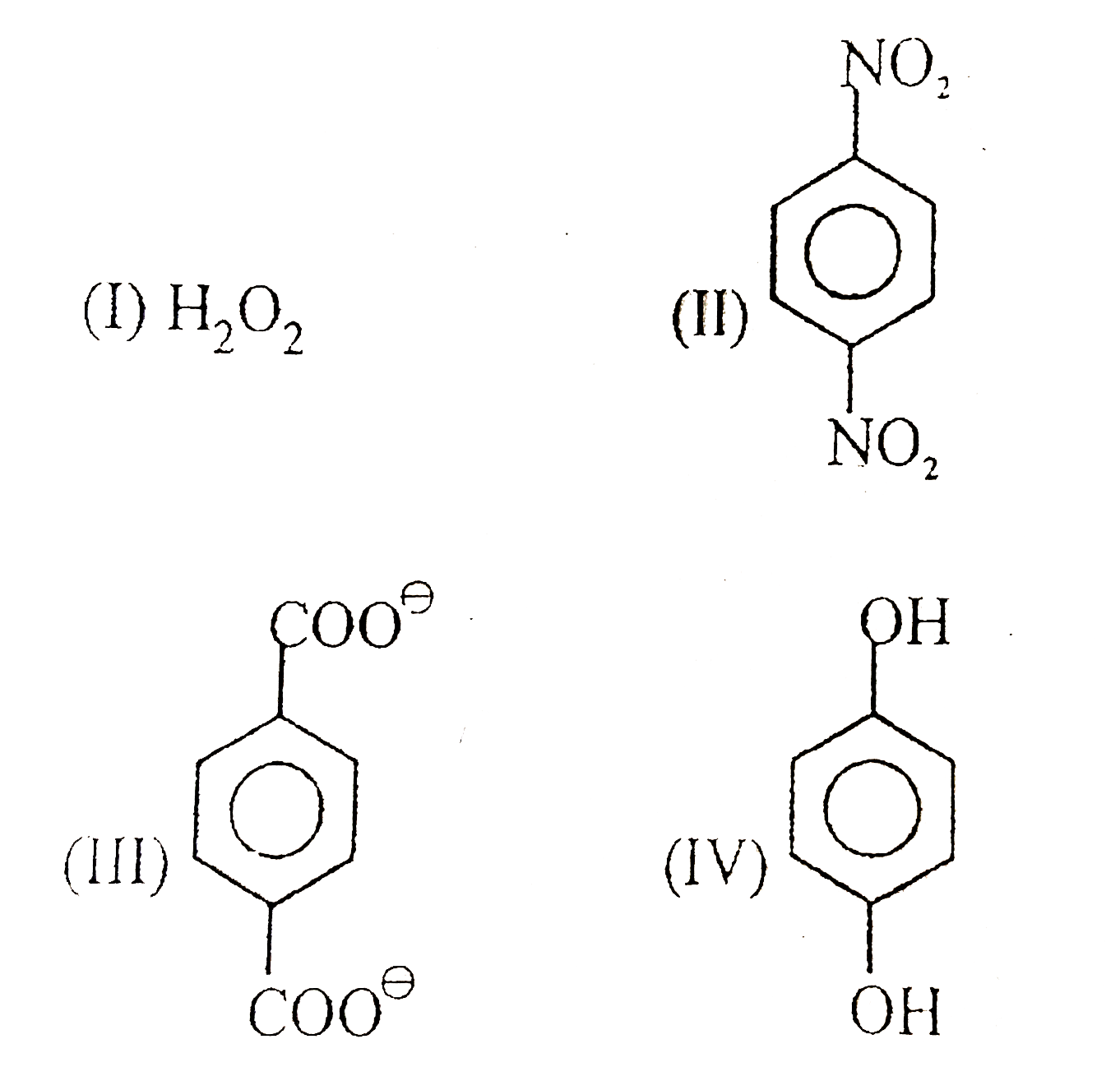Which of the following molecules have zero dipole moment?
(I) gauche conformation of 1, 2 - dibromoethane.
(II) anti conformation of 1, 2 - dibromoethane.
(III) trans - 1, 4 - dibromocyclohexane
(IV) cis - 1, 4 - dibromocylohexane
(V) tetrabromomethane.
(VI) 1, 1- dibromocyclohexane
I and II
II, III and V
II and V
I, IV and VI
The correct Answer is:B
To determine which of the given molecules have a zero dipole moment, we need to analyze the molecular geometry and the arrangement of polar bonds in each case. A molecule will have a zero dipole moment if the individual bond dipoles cancel each other out due to symmetry.
1. Gauche Conformation of 1,2-Dibromoethane (I):
- In the gauche conformation, the bromine atoms are positioned at an angle to each other, leading to a net dipole moment. The dipoles do not cancel out completely.
- Conclusion: This molecule does not have a zero dipole moment.
2. Anti Conformation of 1,2-Dibromoethane (II):
- In the anti conformation, the two bromine atoms are positioned opposite each other. The dipole moments from the bromine atoms will cancel each other out.
- Conclusion: This molecule has a zero dipole moment.
3. Trans-1,4-Dibromocyclohexane (III):
- In the trans configuration, the bromine atoms are on opposite sides of the cyclohexane ring. The dipole moments cancel each other out due to symmetry.
- Conclusion: This molecule has a zero dipole moment.
4. Cis-1,4-Dibromocyclohexane (IV):
- In the cis configuration, both bromine atoms are on the same side of the cyclohexane ring. The dipole moments do not cancel out completely.
- Conclusion: This molecule does not have a zero dipole moment.
5. Tetrabromomethane (V):
- Tetrabromomethane (CBr₄) has a tetrahedral geometry with bromine atoms symmetrically arranged around the central carbon atom. The dipole moments from the four bromine atoms cancel each other out.
- Conclusion: This molecule has a zero dipole moment.
6. 1,1-Dibromocyclohexane (VI):
- In 1,1-dibromocyclohexane, both bromine atoms are attached to the same carbon. The dipole moments from the two bromine atoms do not cancel out due to their arrangement.
- Conclusion: This molecule does not have a zero dipole moment.
Final Answer:
The molecules with zero dipole moment are:
- (II) Anti conformation of 1,2-dibromoethane
- (III) Trans-1,4-dibromocyclohexane
- (V) Tetrabromomethane
- In the gauche conformation, the bromine atoms are positioned at an angle to each other, leading to a net dipole moment. The dipoles do not cancel out completely.
- Conclusion: This molecule does not have a zero dipole moment.
- In the anti conformation, the two bromine atoms are positioned opposite each other. The dipole moments from the bromine atoms will cancel each other out.
- Conclusion: This molecule has a zero dipole moment.
- In the trans configuration, the bromine atoms are on opposite sides of the cyclohexane ring. The dipole moments cancel each other out due to symmetry.
- Conclusion: This molecule has a zero dipole moment.
- In the cis configuration, both bromine atoms are on the same side of the cyclohexane ring. The dipole moments do not cancel out completely.
- Conclusion: This molecule does not have a zero dipole moment.
- Tetrabromomethane (CBr₄) has a tetrahedral geometry with bromine atoms symmetrically arranged around the central carbon atom. The dipole moments from the four bromine atoms cancel each other out.
- Conclusion: This molecule has a zero dipole moment.
- In 1,1-dibromocyclohexane, both bromine atoms are attached to the same carbon. The dipole moments from the two bromine atoms do not cancel out due to their arrangement.
- Conclusion: This molecule does not have a zero dipole moment.
The molecules with zero dipole moment are:
- (II) Anti conformation of 1,2-dibromoethane
- (III) Trans-1,4-dibromocyclohexane
- (V) Tetrabromomethane
Topper's Solved these Questions
Similar Questions
Knowledge Check
- Question 1 - Select One
Which of the following molecules have non-zero dipole moments ?
(I) gauche conformation of 1,2-dibromoethane
(II) anti conformation of 1,2-dibromoethane
(III) trans-1,4-dibromocyclohexane
(IV) cis1,4-dibromocyclohexane
(V) tetrabromomethane
(VI) 1,1-dibromocyclexaneAA) I and IIBB) I and IVCC) II and VDD) I, IV and VI - Question 2 - Select One
Which of the following molecules have non-zero dipole moments ?
(I) Gauche conformation of 1, 2 -dibromoethane
(II) Anti conformation 1,2-dibromorthane
(III) Trans-1,4 -dibromocyclohexane
(IV) Cis-1, 4-dibromocyclohexane
(V) Tetrabromomethane
(VI) DibromocychexaneAI and IIBI and IVCII and IVDI,IV and Vi - Question 3 - Select One
Which of the following molecule has zero dipole moment ?
(1) H2O2
(2) AOnly IBboth II and IIICI, III and IV allDI, II and III only
AOnly IBboth II and IIICI, III and IV allDI, II and III only
The most stable conformation of 1,2-diphynylethane is:
View SolutionThe prefered conformation of trans-1, 2- dibromocyclohexane is:
View SolutionWhich of the following molecule (s) have dipole moment
(I) Trans -pent -2-me
(II) cis-hex -3-ene
(III) 2,2-Dimethy1 propane
(IV) 2,2,3,3 tetramethy1 butane .View SolutionWhich one of the following is most preffered conformation of 1,2-dimethyl cyclohexane?
View SolutionThe most stable conformer of 1, 2-diphenyl ethane is:-
View Solution

